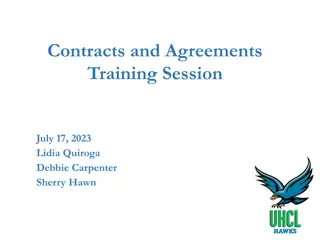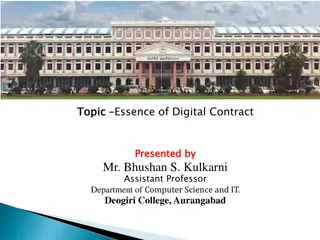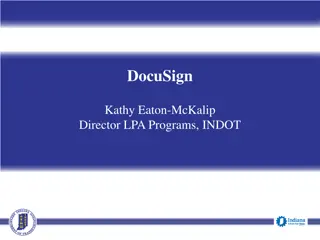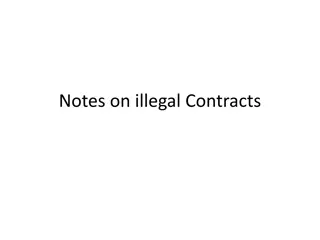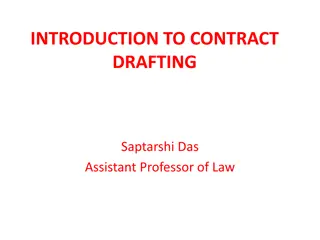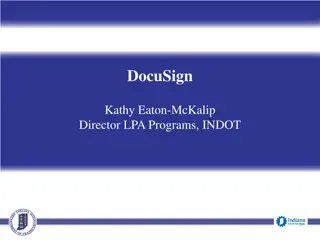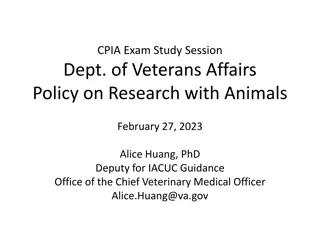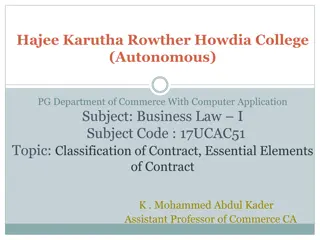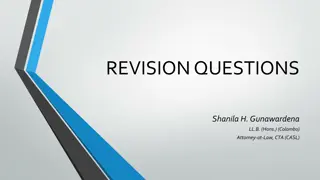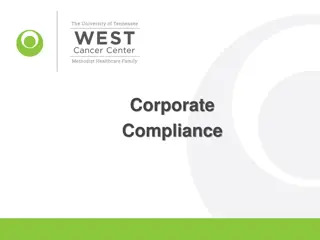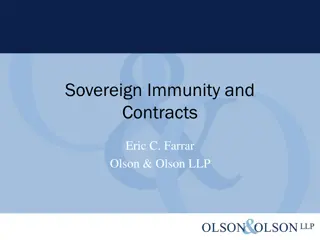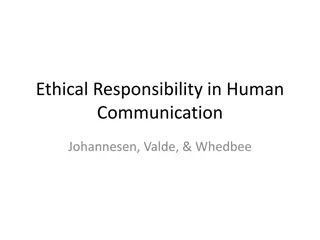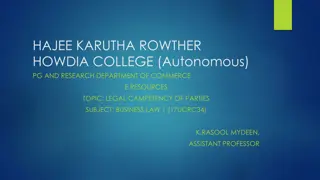Ensuring Ethical Compliance in Legal Service Contracts
This overview delves into the ethical considerations and pitfalls in legal services contracts, emphasizing fiduciary duties, conflicts of interest, client confidentiality, and lawyer advertising. Key points include clarity in fee contract writing, disclosures, conflict waivers, and the importance of upholding ethical standards in client representation.
Download Presentation

Please find below an Image/Link to download the presentation.
The content on the website is provided AS IS for your information and personal use only. It may not be sold, licensed, or shared on other websites without obtaining consent from the author. Download presentation by click this link. If you encounter any issues during the download, it is possible that the publisher has removed the file from their server.
E N D
Presentation Transcript
Ethical Considerations and Pitfalls: An Overview The FUNDAMENTALS: Writing the Legal Services Contract: Rule 1.04 and Fiduciary Duty Concerns Conflicts of Interest: Rules 1.06 and 1.09 Client Incapacity Risks: Rule 1.02, Duty of Care and Fiduciary Duty Considerations. Client Confidential Information: Rule 1.05 Lawyer Advertising: Rules 7.01-7.07 THE NEW AND NOT SO NEW: Professional Ethics Committee Opinions: Estate Planning Questions and Answers 2
Hoover Slovacek v. Walton (2006) THE TEXAS SUPREME COURT: THE DUTY IS THE HIGHEST WHEN THE ATTORNEY CONTRACTS WITH HIS OR HER CLIENT OR OTHERWISE TAKES A POSITION ADVERSE TO HIS OR HER CLIENT S INTERESTS. QUOTING JUSTICE CARDOZA: [A FIDUCIARY] IS HELD TO SOMETHING STRICTER THAN THE MORALS OF THE MARKETPLACE. NOT HONESTY ALONE, BUT THE PUNCTILIO OF AN HONOR THE MOST SENSTIVE, IS THEN THE STANDARD OF BEHAVIOR. 3
Writing the Fee Contract KEY POINTS: 1. SCOPE OF REPRESENTATION CLEARLY DEFINED 2. FEES CLEARLY IDENTIFIED AND CALCULATION DESCRIBED 3. CLIENTS (AND SOMETIMES NON-CLIENTS) CLEARLY IDENTIFIED PARTICIPATING LAW FIRM(S) CLEARLY IDENTIFIED BY NAME RULE 1.04(F) DISCLOSURES: LAW FIRMS, PERCENTAGES, BASES FOR DIVISION OF FEES, CLIENT WRITTEN CONSENT IN ADVANCE OF OTHER LAW FIRMS JOINING 4
Writing the Fee Contract CLARITY: AVOID THE WHEREAS, HERETOFORES, AND OTHER CONVOLUTED MEANINGLESS LEGALISTIC CONTRACT TRANSLATION SPEAKING/READING CLIENT. AND OFTEN LANGUAGE ALSO FOR NON-ENGLISH THE AUDIENCE FOR A FEE CONTRACT IS NOT ONLY THE CLIENT, BUT MAY ALSO INCLUDE JUDGES, JURIES, AND APPELLATE COURTS. WHAT WOULD THEY THINK? CONFLICTS DISCLOSURES AND WAIVERS UNDER RULE 1.06? (DESCRIBE CONFLICT OR POTENTIAL CONFLICTS, IMPLICATIONS DISADVANTAGES, ADVANTAGES, ETC.). COMMENT 7 TO RULE 1.06: DISINTERESTED LAWYER TEST? TO THE CLIENT, 5
Writing the Fee Contract NO GLOBAL CONFLICTS WAIVERS TEXAS LAW APPLIES? VENUE FOR DISPUTES? FORUM FOR DISPUTES? ARBITRATION OR COURT? INTEGRATION PROVISION: ANY PRIOR AGREEMENTS INTEGRATED INTO THE FEE CONTRACT? SEVERABILITY PROVISION: TO SAVE THE GOOD SO A BAD PROVISION DOESN T PULL DOWN THE WHOLE CONTRACT? NO GUARANTEES, PROMISES, OR WARRANTIES ABOUT OUTCOMES? 6
Writing the Fee Contract DON T ACQUIRE A PROPRIETARY INTEREST IN THE SUBJECT MATTER OF THE REPRESENTATION DON T CONTRACT FOR LITERARY OR MEDIA RIGHTS (UNTIL THE REPRESENTATION IS OVER) NO PROSPECTIVE MALPRACTICE LIMITATION OR WAIVER BY CLIENT UNLESS CLIENT IS INDEPENDENTLY REPRESENTED IN MAKING THE LIMITATION OR WAIVER. CONTRACT SIGNED AND DATED BY CLIENT? CONTRACT SIGNED AND DATED BY LAW FIRM? USUALLY IMPORTANT TO HAVE A SIGNATURE OF THE PARTY AGAINST WHOM THE CONTRACT IS BEING ENFORCED IN A DISPUTE. BOTH SIGNATURES REQUIRED, BUT 7
Writing the Fee Contract FIRST STEPS: READ YOUR FEE CONTRACT TODAYAND UPDATE. READ IT EVERY TIME YOU CONTRACT WITH A NEW CLIENT DON T ALLEGEDLY WORKED FOR ANOTHER LAWYER OR LAW FIRM IS RIGHT FOR YOU. IT MAY CONTAIN ILLEGAL OR IMPROPER PROVISIONS. ASSUME THAT A CONTRACT THAT DON T BECOME COMPLACENT ABOUT FORM CONTRACTS SOMETIMES A CUSTOM CONTRACT IS NEEDED. 8
Conflicts of Interest SOME BASIC TEXAS RULES 1. TEXAS RULE 1.06 (General Conflicts of Interest Rule) (b) In other situations and except to the extent permitted by paragraph (c), a lawyer shall not represent a person if the representation of that person: (1) involves a substantially related matter in which that person's interests are materially and directly adverse to the interests of another client of the lawyer or the lawyer's firm; or (2) reasonably appears to be or become adversely limited by the lawyer's or law firm's responsibilities to another client or to a third person or by the lawyer's or law firm's own interests. 9
Conflicts of Interests and Conflicts Waivers (c) A lawyer may represent a client in the circumstances described in (b) if: (1) representation of each client will not be materially affected; and [SEE COMMENT 7 TO THIS RULE] the lawyer reasonably believes the (2) each affected or potentially affected client consents to such representation after full disclosure of the existence, nature, implications, and possible adverse consequences representation and the advantages involved, if any. of the common 10
Conflicts of Interest: Rule 1.06 (d) A lawyer who has represented multiple parties in a matter shall not thereafter represent any of such parties in a dispute among the parties arising out of the matter, unless prior consent is obtained from all such parties to the dispute. (e) If a lawyer has accepted representation in violation of this Rule, or if multiple representation properly accepted becomes improper under this Rule, the lawyer shall promptly withdraw from one or more representations to the extent necessary for any remaining representation not to be in violation of these Rules. (f) If a lawyer would be prohibited by this Rule from engaging in particular conduct, no other lawyer while a member or associated with that lawyer's firm may engage in that conduct. 11
Conflicts of Interest: Rule 1.09 Texas Rule 1.09 (Former Client Conflicts): (a) Without prior consent, a lawyer who personally has formerly represented a client in a matter shall not thereafter represent another person in a matter adverse to the former client: (1) in which such other person questions the validity of the lawyer's services or work product for the former client; (2) if the representation in reasonable probability will involve a violation of Rule 1.05; or (3) if it is the same or a substantially related matter. 12
Conflicts of Interest Texas Rule 1.09 (continued): (b) Except to the extent authorized by Rule 1.10, when lawyers are or have become members of or associated with a firm, none of them shall knowingly represent a client if any one of them practicing alone would be prohibited from doing so by paragraph (a). (c) When the association of a lawyer with a firm has terminated, the lawyers who were then associated with that lawyer shall not knowingly represent a client if the lawyer whose association with that firm has terminated would be prohibited from doing so by paragraph (a)(1) or if the representation in reasonable probability will involve a violation of Rule 1.05. 13
Conflicts of Interest: Rule 1.08(a) and (b): Business Transactions with Clients and Testamentary Gifts (a) A lawyer shall not enter into a business transaction with a client unless: (1) the transaction and terms on which the lawyer acquires the interest are fair and reasonable to the client and are fully disclosed in a manner which can be reasonably understood by the client; (2) the client is given a reasonable opportunity to seek the advice of independent counsel in the transaction; and (3) the client consents in writing thereto. (b) A lawyer shall not prepare an instrument giving the lawyer or a person related to the lawyer as a parent, child, sibling, or spouse any substantial gift from a client, including a testamentary gift, except where the client is related to the donee. 14
Texas Rule 1.02 and Client Incapacity Rule 1.02 concerns the lawyer s scope of representation and what are properly the client s decisions versus the lawyer s decisions. (g) A lawyer shall take reasonable action to secure the appointment of a guardian or other legal representative for, or seek other protective orders with respect to, a client whenever the lawyer reasonably believes that the client lacks legal competence and that such action should be taken to protect the client. What might trigger this concern? 15
Texas Rule 1.02(g)Official Comments 12. Paragraph (a) assumes that the lawyer is legally authorized to represent the client. The usual attorney-client relationship is established and maintained by consenting adults who possess the legal capacity to agree to the relationship. Sometimes the relationship can be established only by a legally effective appointment of the lawyer to represent a person. Unless the lawyer is legally authorized to act for a person under a disability, an attorney-client relationship does not exist for the purpose of this rule. 16
Texas Rule 1.02(g)Official Comments 13. If a legal representative has already been appointed for the client, the lawyer should ordinarily look to the representative for decisions on behalf of the client. If a legal representative has not been appointed, paragraph (g) requires a lawyer in some situations to take protective steps, such as initiating the appointment of a guardian. The lawyer should see to such appointment or take other protective steps when it reasonably appears advisable to do so in order to serve the client's best interests. See Rule 1.05 (c)(4), d(1) and (d)(2)(i) in regard to the lawyer's right to reveal to the court the facts reasonably necessary to secure the guardianship or other protective order. 17
Client Confidential Information Texas Rule 1.05: (a) Confidential information includes bothprivileged information and unprivileged client information. Privileged information refers to the information of a client protected by the lawyer-client privilege of Rule 5.03 of the Texas Rules of Evidence or of Rule 5.03 of the Texas Rules of Criminal Evidence or by the principles of attorney-client privilege governed by Rule 5.01 of the Federal Rules of Evidence for United States Courts and Magistrates. Unprivileged client information means all information relating to a client or furnished by the client, other than privileged information, acquired by the lawyer during the course of or by reason of the representation of the client. 18
Client Confidential Information Texas Rule 1.05: Several exceptions to confidentiality; however, some exceptions apply broadly to both privileged and unprivileged client information and some only apply to unprivileged client information. No exception for public information i.e., information contained in a public record, pleading, court document, etc. There is an exception for generally known but this is notthe same as public information . See Texas Professional Ethics Opinion 595 (2010). 19
Rule 1.05: Client Confidential Information (Rule 1.02--Comment references re: disability) (c) A lawyer may reveal confidential information: (4) When the lawyer has reason to believe it is necessary to do so in order to comply with a court order, a Texas Disciplinary Rule of Professional Conduct, or other law. (d) A lawyer also may reveal unprivileged client information. (1) When impliedly authorized to do so in order to carry out the representation. (2) When the lawyer has reason to believe it is necessary to do so in order to: (i) carry out the representation effectively; 20
Lawyer Advertising Texas Rules 7.01 to 7.07 deal with lawyer advertising. Lawyer Advertising is Highly Regulated in Texas There are Content Rules and there are Filing Rules. Make sure that your lawyer advertising is filed (i.e., received) by the Advertising Review Department of the State Bar no later than the first day you use, publish, air, or send that advertising to potential clients. 21
Lawyer Advertising LAW FIRM WEBSITES ARE LAWYER ADVERTISING AND MUST BE FILED WITH THE ADVERTISING REVIEW DEPARTMENT. SUBSTANTIVE CHANGES TO A LAW FIRM WEBSITE REQUIRE A NEW SUBMISSION TO THE ADVERTISING REVIEW DEPARTMENT. SOCIAL TWITTER ARE LAWYER ADVERTISING IF THEY SOLICIT POTENTIAL CLIENTS OR PROMOTE YOUR LEGAL SERVICES. MEDIA FACEBOOK, LINKED-IN, 22
Texas Professional Ethics Opinion 662 (2016) IF YOU RECEIVE A BAD ONLINE REVIEW FROM A CLIENT OR FORMER CLIENT, WHAT DO YOU DO? RULE 1.05: CLIENT CONFIDENTIAL INFORMATION IN CONFIDENTIAL INFORMATION WHICH LIMITS YOUR ABILITY TO RESPOND SPECIFICALLY TO ALLEGATIONS EVEN FALSE ALLEGATIONS. RESPONDING, DO NOT DISCLOSE CLIENT SAMPLE RESPONSE: A lawyer s duty to keep client confidences has few exceptions and in an abundance of caution I do not feel at liberty to respond in a point by point fashion in this forum. Suffice it to say that I do not believe that the post presents a fair and accurate picture of the events. 23
Texas Professional Ethics Opinion 641 (2014) QUESTION: Do the Texas Disciplinary Rules permit a lawyer to accept client referrals from a financial planning services company that regularly engages the lawyer to provide legal services to the company? The company offers financial planning services, including selling securities and life insurance products, to its customers. The lawyer provides legal services to the company BUT does not provide legal services to the company s customers as part of the lawyer s legal services to the company. RULES? 1.06(b), 2.01, 5.04(c), and 7.03(b) and (c) CONCLUSION? 24
TEXAS PROFESSIONAL ETHICS OPINION 678 (2018) QUESTION: UNDER THE TEXAS DISCIPLINARY RULES, MAY A TEXAS LAWYER CONCURRENTLY AS THE EXECUTOR OF AN ESTATE AND AS LEGAL COUNSEL FOR THE EXECUTOR? IF NOT, MAY ANOTHER LAWYER IN HIS LAW FIRM SERVE AS LEGAL COUNSEL FOR THE EXECUTOR? FACTS: LAWYER S PARENT HAS DIED. THE WILL NAMES LAWYER AS EXECUTOR. LAWYER AND SIBLINGS ARE BENEFICIARIES. LAWYER ALSO INTENDS TO ACT AS LAWYER FOR THE EXECUTOR AS WELL AS ACTING AS EXECUTOR. IF THE LAWYER CANNOT ACT AS BOTH, LAWYER INTENDS TO HAVE ANOTHER LAWYER IN THE FIRM ACT AS COUNSEL TO THE EXECUTOR. RULES? 1.06(b)(c) and (f). Maybe 3.08? AGREE TO SERVE 25
The End 26









